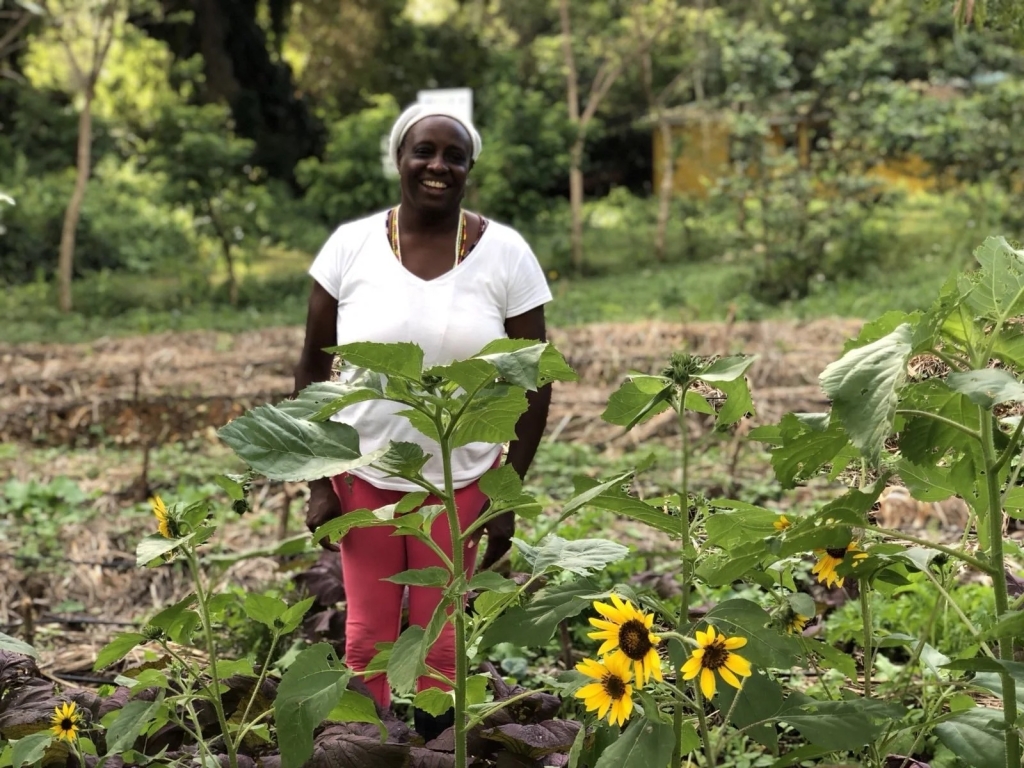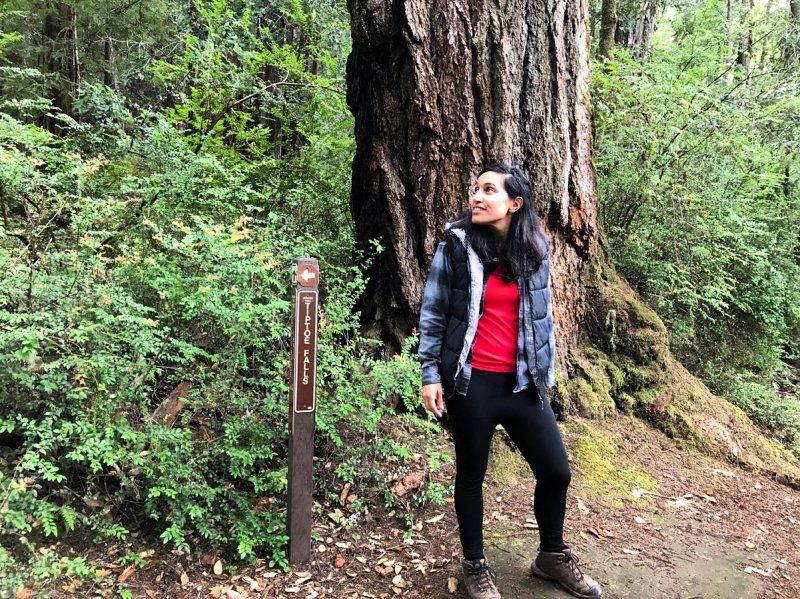An Ambassador for the Natural World Speaks
By Brian Simpson

In a world obsessed with Artificial Intelligence, a Jamaican priest and farmer calls us back to the original, life-sustaining network: Organic Intelligence.
In an age where we marvel at algorithms that can mimic human thought, we are quietly forgetting how to listen to an intelligence far more ancient and profound—the wisdom of the living world. For Nicola Shirley-Phillips, a Yoruba priest and ecological pioneer in Jamaica, communicating with this organic network isn’t a metaphor; it’s her reality.
In a powerful interview, Nicola shares her journey from a business owner in Philadelphia to becoming an “Ambassador for the natural world” in Jamaica, a path guided by spirit ancestors and a direct line to the consciousness of trees. Her story is a compelling call to midwife humanity back into alignment with the natural world.
The Day the Trees Spoke
Nicola’s journey into this ambassadorial role began not with a grand plan, but with a simple, radical suggestion to a family member, who was struggling with cannabis use: “Why don’t you ask the plant?”
This innate openness to the sentience of nature was the seed which blossomed later into initiation within the nature-based spirituality of the Yoruba people of South-West Nigeria.
While this path expanded her awareness of other dimensions of Life and our capacity to connect, she had never seriously considered communing with plant spirits; her focus had been on the other elemental forces she was trained to work with. However, this changed during an impromptu libation to acknowledge the spirits on a newly donated plot of land that would become an organic research station.
“I started hearing stuff,” Nicola recalls. “And I’m like, is it me? What the heck is going on here?”
The message from the tree spirit was clear: “We communicate all the time. You guys are moving too fast and need to slow down.” The spirit used the powerful analogy of dropping someone who doesn’t speak Chinese in the middle of China. The difficulty in communication isn’t due to a lack of intelligence on either side, but a lack of shared language and slowness to learn it.
The trees proceeded to download a wealth of information—on tree bathing, forest healing, and their role as the “base frequency of the planet.” When Nicola later researched these concepts, she found modern science only now catching up to what the spirits had shared. “That was really beautiful… what was said out of spirit from the tree.”
OI vs. AI: The Real Intelligence is Already Here
This experience cemented her understanding of Organic Intelligence (OI)—a term she positions as the necessary counterbalance to the frenzy around Artificial Intelligence (AI).
“Everybody is making this big excitement about this AI thing,” she observes. “But it’s all of our stuff… It’s our intelligence.” She sees AI not as a revolutionary creation, but as an extraction and repackaging of human knowledge, a “false god” that risks disconnecting us from the true source.
“Everything they’re trying to show us, it’s already done in Organic Intelligence… The work of a plant or an ant, or even our brain… It’s almost like a false way of doing it, when you could just go sit and meditate and make that divine connection.”
For Nicola, the traditional practices of shamans, sangomas, and divination priests are the original interfaces for querying this organic supercomputer. “You’re asking the universe these questions, and you’re coming back with a quantum answer.”
Her message is stark: why choose the artificial when the real deal is all around us?
“They tell you straight up, it’s artificial. So… if it’s artificial, what are they taking it from? They’re taking it from us, and we are part of the organic intelligence!”
The People’s Seed Bank: Decentralizing Life
This philosophy translates directly into her practical work. As a co-founder of the Ujima Natural Farmers Market and a leader in Jamaica’s organic movement, Nicola is spearheading the “People’s Seed Bank” initiative.
This is not a bank in the traditional, centralized sense. After learning of a massive, state-of-the-art seed bank project in Jamaica that was lost to 1970s politics and literally erased from collective memory, Nicola advocates for a decentralized model.
“The seed is really the people’s seed, and it should be distributed and shared,” she explains. Her vision is one of resilience through diversity and distribution. If a hurricane or blight wipes out one gardener’s purple potato, another steward in a different parish will have it. This stands in direct opposition to a globalized system that pushes farmers toward proprietary, imported seeds, creating dependency and vulnerability.
“Whoever controls the seeds, controls the world,” she states, highlighting the urgent need for food sovereignty through community-led stewardship.
A 100-Year Plan: Patience and Faith in a Faster World
Nicola’s return to Jamaica from the U.S. was itself an act of faith, a destiny revealed to her in a spiritual reading at age 25. It required shedding deeply ingrained beliefs about success and resources, particularly the primacy of money.
“I had to let go of that and allow spirit and the ancestors to bring the things that are needed.” This faith has been validated in miraculous ways, most astonishingly through the gift of 370 acres of land for the organic research station—a direct result of listening to spirit and being seen as a trustworthy steward.
This long-view perspective is central to her work. While the Ujima market has thrived for 14 years, she speaks of a “100-year plan.” She understands that healing the disconnect of centuries requires patience, community, and a fundamental re-evaluation of what abundance means.
“We have a 12-month growing season. We have such beauty here… We need to look at the resources that we have.” True abundance, she argues, is found in sharing knowledge, trading time and resources, and living in a way that respects the natural cycles of giving and receiving.
The Call to Midwife: A Message for Our Time
For those feeling the call to this work, whether in Jamaica or elsewhere, Nicola’s advice is profoundly simple: “Work spirit first.”
In a world of constant doing, her ultimate guidance is to be still. “Develop a good head. Call in your guides, call in your ancestors… There’s a lot of unemployment in the spirit world. You gotta put them to work.”
She sees those who are already connected to OI as having a critical role: to “midwife people back into the natural world.” This means creating spaces—through teaching, reasoning, or simply sharing stories—for others to remember their divine connection.
“The first step is to go outside and connect with the frequency of your mother, which is the plants and the trees that have been feeding you all this time… Understand the divine connection that you have on this planet to those other entities that are there to only nurture you and take care of you.”
In a time of ecological and spiritual crisis, Nicola’s message is not one of fear, but of remembrance. The most advanced intelligence we need isn’t in a server farm; it’s in the forest. The most revolutionary act isn’t to build something new, but to listen to something ancient. And the most sustainable future is one built not on extraction, but on a sacred, spoken dialogue with the living world.
